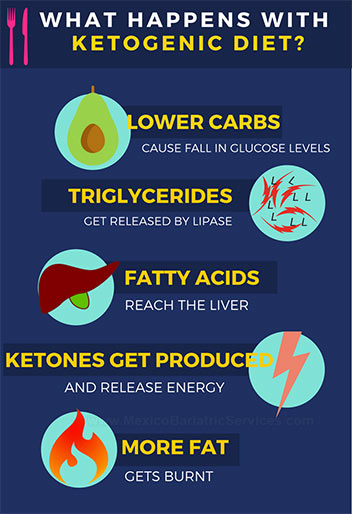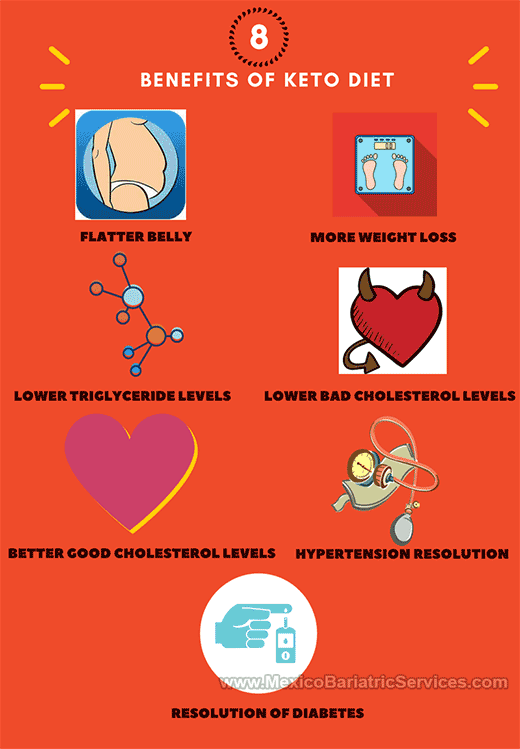Guide to Going Keto After Bariatric Surgery
Medically Reviewed by Katelyn J. Mock, US-Registered Dietician (R.D.)
A research study by Nicholas J Krilanovich1 published in the American Journal of Nutrition states that reducing carbohydrates and switching over to a fat-rich ketogenic diet allows for drastically cutting down calories without feeling rapaciously hungry.
Logically, consumption of more fat would mean elevated cholesterol levels; however, there are numerous research studies2 pointing that the logic-defying ketogenic diet actually results in reduced bad cholesterol (LDL) levels and elevated good cholesterol (HDL) levels. This is achieved by forcing your carb-deprived body to convert fat into fatty acids and ketones, and utilize them for energy. So carbs get replaced with fat as the main source of energy for the body. In other words, your body is practically running on (read burning) fat.

The Ketogenic Cheat Sheet
| What to Eat? | What Not to Eat? |
|---|---|
| Meat | Sugar Laden Foods (soda, cakes, cookies) |
| Chicken | Cereals |
| Turkey | Pasta and Bread |
| Fish | Beans and Legumes |
| Eggs | Processed Vegetable Oils |
| Good Fats (olive, avocado, ghee, butter ) | Alcohol |
| Veggies | Sugar-Free and Low-Fat Products |
| Minimal Amounts of Fruits | Starchy Vegetables |
To Keto or Not to Keto After Weight Loss Surgery?
With all the buzz around it, you have to modify your approach to ketogenic diet in case you have had weight loss surgery. The basic premise of keto – high fat-low carb – has to marry the high protein-low carb bariatric philosophy. And the result – a low carb, high fat, higher protein diet suiting your altered stomach and digestive system.
Ketogenic diet has many benefits, some of which are:
- Low Carbs = Lower Appetite
- More Weight Loss
- Loss of Pesky Belly Fat
- Lowered Blood Triglycerides
- More Good Cholesterol
- Less Bad Cholesterol
- Improvement in Type 2 Diabetes
- Lowered Blood Pressure Levels

Typical Bariatric-Friendly Keto Meals
Here are some sample ketogenic menus suitable for those who’ve had bariatric surgery:
| Day 1 | Day 2 | Day 3 | |
|---|---|---|---|
| Breakfast | · Bacon/eggs · 1/2 grapefruit |
· Bacon · 1/2 cup diced papaya |
Sausage with slices of apple |
| Lunch | Chicken/green salad with avocados | · Tuna salad · Green salad with sliced apple |
Shrimps with avocados |
| Dinner | · Baked salmon with spinach sautéed in butter · 1/2 cup fresh berries |
· Baked chicken · 1/2 sweet potato with butter or eggplant with parmesan cheese and green salad |
Flank steak with asparagus |
| Snack | Guacamole with veggies /cottage cheese | Whole-milk plain yogurt with berries | Protein shake/string cheese |
* Adapted from St Louis, Betty Wedman. “Appendix 1 – Ketogenic (Low Carbohydrate ) Diet.” Bariatric Surgery Patients: A Nutritional Guide. CRC, 2017.
What to Look Out for?
- Not more than 1 teaspoon butter/ghee per meal
- No full fat whole milk
- No heavy cream
- No cream cheese, including the low fat variety
- No skinny lattes
- No eating till you feel stuffed or till the point your are uncomfortable
Some Keto-Friendly Swaps
- Zoodles (made of zucchini using a spiralizer) instead of pasta or noodles
- Cauliflower pearls instead of rice
- Low fat cheese in place of cheddar cheese
- Unsweetened tea or coffee instead of the non-fat milk variety laden with artificial sweeteners
The Pre-Op Keto Bonus
There are some research studies pointing at the positive effects of ketogenic diet on pre-operative bariatric patients. According to Frida Leonetti and colleagues3, low carb-ketogenic diet results in reduction of body mass index (BMI), waist circumference and neck circumference, and even decreased diabetic medication after following a pre-operative ketogenic dietary regimen.
We want to reiterate that bariatric surgery is no magic pill. The onus of its success is primarily on you – the eating habits and commitment to lifestyle changes. A modified keto diet can be a great way to eat well while feeling sated at the same time.
Just make sure you consult your bariatric surgeon as well as the nutritionist before you take the plunge, as they will rightfully help with the modifications to suit your new stomach and digestive system. Go Keto!
Sources:
1) Nicholas J Krilanovich. Benefits of ketogenic diets. Am J Clin Nutr January 2007 vol. 85 no. 1 238-239
2) Hussein M. Dashti, Naji S. Al-Zaid, Thazhumpal C. Mathew, Mahdi Al-Mousawi, Hussain Talib, Sami K. Asfar and Abdulla I. Behbahani. Long term effects of ketogenic diet in obese subjects with high cholesterol level. Molecular and Cellular Biochemistry 286: 1–9, 2006. DOI: 10.1007/s11010-005-9001-x
3) Frida Leonetti, Fabio Cesare Campanile, Federica Coccia, Danila Capoccia, Laura Alessandroni, Alessandro Puzziello, Ilenia Coluzzi, Gianfranco Silecchia. Very Low Carbohydrate Ketogenic Diet Before Bariatric Surgery: Prospective Evaluation of a Sequential Diet. Obesity Surgery > Issue 1/2015

